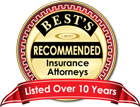Case Law Update – October 2016
GOING AND COMING RULE
Khristine Quinn v. CP Franchising LLC, No. 1D16-0257 Fla 1st DCA (October 13, 2016)
The claimant appealed a Final Merits Order issued by JCC Daniel Lewis which found that her trip and fall accident in a parking lot adjacent to her employer’s leased place of business did not arise out of or in the course and scope of her employment. At issue were the exceptions to the “going and coming” rule. The First DCA after analysis found that none of the exceptions to the going and coming rule applied and as a result, affirmed JCC Lewis’ ruling that the injury was not compensable.
The facts of the case involved claimant, Khristine Quinn, who tripped and fell in a parking lot which was adjacent to her place of employment. In this case, the parking lot in question was not owned by the employer nor was it leased by the employer. The employer was not assigned any specific parking spaces within the lot where the fall occurred. Rather, the employer, pursuant to its lease agreement for its office space was allotted 32 unassigned parking spaces for its non-exclusive use. The employer paid a fee to the landlord for maintenance of the common areas of the leased premises but there was no evidence that the employer exercised any control over the maintenance or how the fee was applied to the parking area.
The going and coming rule is subject to a number of exceptions. There are three most notable exceptions which are where (1) special hazards exist on the normal route; (2) the employee travels between two parts of the employer’s premises; and (3) the area where the injury occurred was used by the employer for the employer’s purposes. The court upheld JCC Lewis’ decision that photographs of the parking lot where the accident occurred did not show any special hazard. The JCC found there was no special hazard that led to the accident. The First DCA held that the primary issue before it was whether the employer had sufficient control of the area where the claimant fell in order for the parking area to be considered either part of the employer’s premises or an area that was actually used by the employer for its purposes.
The First DCA concluded based upon the above facts that the employer had insufficient control of the parking lot either for the lot to be considered part of the employer’s premises or for the employer’s use of that lot to be considered a “special use”.
The JCC stated that in the instant case the parking lot in question was open to and used by the public. There was no evidence that the lot was used by the employer or its employees in any way materially different from the public in general or that the employer excluded others from use of the lot.
Based upon the above, the First DCA affirmed JCC Lewis’ decision that this accident did not occur in the course and scope of her employment as none of the exceptions to the going and coming rule apply.
Practical Application:
This case further elaborates on the requirements for an accident occurring off premises to meet an exception to the going and coming rule. The case makes clear that in order for an accident occurring in a parking lot not owned by the employer, there must be some evidence linking the accident to the employer’s special use or connection to the parking lot.
Please feel free to contact any of our workers’ compensation attorneys listed below if you wish to discuss this case and its application to your claims. You may reach us at the telephone numbers or e- mail addresses listed below:
Fort Lauderdale/East Coast Office: (954) 462-4304
Walter C. Wyatt, Partner – ext. 218
wcwyatt@fla-esq.com
Robert M. Potter, III, Partner – ext. 222
rmpotter@fla-esq.com
St. Petersburg/West Coast Office: (727) 322-1739
Joseph A. Bayliss, Partner – ext. 201
jbayliss@fla-esq.com
Jerome B. Blevins, Partner – ext. 205
jblevins@fla-esq.com




